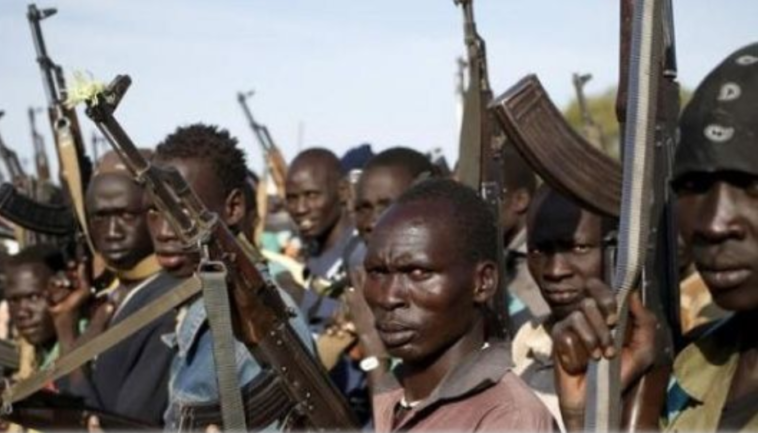A young lady who is a friend of mine sent me a message to say that she was going to Dubai for a holiday. I sent a message telling her to “enjoy that beautiful place that patriotic people built for their country unlike this Hobbesian jungle in which we live.” By that time I did not know that Kaduna International Airport had been invaded by, as the reports say, hundreds of bandits who swore that no plane would take off from or land at that airport.
One airport personnel was said to have been killed while some parts of the airport were vandalised. Their grouse, we are told, is that some military personnel came and took away their cows apparently for pepper soup. And since they do not want to be cowed, they also decided to take away our freedom to travel in and out of the airport. From available reports, military personnel have now retrieved the airport from the custody of the bandits but it is uncertain at the point of writing this whether or not the bandits have taken back their cows. But what is certain is that we have now found ourselves in that Hobbesian jungle where anything untoward can happen at any time in any city in Nigeria.
What was on my mind when I sent that message to the young lady was what happened to her when she travelled with her newly acquired husband to Dubai for their honeymoon a few years ago. On getting there, she suddenly felt sick and was admitted in one of the well-equipped hospitals there. They were sure they would have to pay a bundle on her discharge but to their pleasant surprise they were told “you don’t have to pay anything. This is a government hospital.” In Nigeria, government hospital or not, foreigner or not, she would have been tied hands, feet and neck to the hospital bed until every kobo owed is paid.
For some years now the group called the Indigenous People of Biafra (IPOB) has been ordering people in the five states of the South East to stay at home on certain days of the week particularly on Mondays. Sometimes on the day Nnamdi Kanu, their leader, is taken to court, it also commands people – workers, students, traders, anyone – to stay strictly at home and not risk the consequence of stepping out. And the consequence has a ringing finality: death. When you examine the four corners of that directive you find nothing that ought, commonsensically, to recommend it for implementation. Only the Igbo and their economy are hurt by it. Other persons outside Igbo land are going about their businesses.
People outside Igbo land are unlikely to contemplate investing in the South East because that would be money simply flushed away. Who loses? The Igbo. I sympathise with the newly minted Governor Chukwuma Soludo of Anambra State who has told his workers not to obey the sit-at-home directive. They are not obeying because they want to obey. They are doing so because they want to save their lives since there is ample evidence that some of those who disobeyed the order did not live to regret it. Don’t forget that in the Hobbesian jungle, life is “nasty, brutish and short.” What the IPOB fellows are doing does not touch President Muhammadu Buhari one jot.
The IPOB logic is probably that if the economy of the South East is crippled by the stay-at-home order, Buhari will feel that it will also negatively affect the national economy. If it affects the national economy then Buhari will grant their request for a new country called Biafra. That kind of response is very farfetched because Buhari was not elected to come and bring about a bifurcation of the country. The IPOB is asking for a referendum.
Did they conduct a referendum to ascertain that South Easterners want a separate country before embarking on this adventure? In the unlikely event that there is a referendum, no one can guarantee that most South Easterners who went through the horrors of the war or who have read about the atrocities would want their future put in the hands of young people who never went through the excruciating trauma of that civil war. How would they build a nation without the past as the rule book?
As if Nigerians were searching for some kind of comic relief in the midst of all the excruciating existential problems that threaten to drown us, the Nigerian Correctional Centre in Kirikiri, Lagos, offered us one. They organised a beauty pageant for the female convicts and suspects to mark the International Women’s Day. One of the young ladies whose case of alleged murder has dominated the front pages of newspapers for the past several months, Miss Chidinma Ojukwu, won. What prize did she win? A car? Money? Opportunity for a beauty pageant in London or Dubai? Or freedom from further prosecution? The whole thing sounds so silly that the less talked about it the better for those who conceived of this weird idea. But I am not really surprised because when you look at some of the things that are happening in this beleaguered country every day you may choose to call this “Nigeria’s silly season.”
The glamourisation of criminals and suspects through a beauty pageant is nothing short of an attempt to put us in the Hobbesian jungle, where silliness is the order of the day. Perhaps, the organisers of the prison beauty pageant were lured by Avery’s Observation which states that “it does not matter if you fall down as long as you pick up something from the floor while you get up.” All those in Kirikiri are down because that is not the equivalent of a seven star hotel but maybe the idea was to show us that they may be down but not out. They have their beauty to show us even though we cannot touch them. There is nothing beautiful about a prison. I have been there a few times so I should know.
Another interesting drama took place in our lives recently in Lagos. A woman, Ms Chidinma Ogbulu, described in the media as a “socialite” (I wonder if “socialite” is a profession) wanted to show her milk of human kindness to petrol-starved Lagosians on the occasion of her coronation as a chief or something like that. Knowing that petrol was in short supply and the queue for it several kilometres long, she bought kegs and kegs of the rare liquid to distribute as souvenirs. She thought that might touch the hearts of people hungry for petrol better than umbrellas, electric kettles, food flasks or even telephones as take-always. She did not avert her mind to the fact that the liquid is highly inflammable and that some people smoke at such gatherings thus potentially putting hundreds of lives at risk.
If she didn’t know the management of the Havilah Events Centre where the ceremony was taking place should have known but they looked the other way. The law enforcement authorities were not ready to look the other way. The lady, sorry socialite, was dragged to court. A few days ago, a Chief Magistrate’s Court led by Kehinde Ogundare convicted and sentenced her to two years in prison. However, there is an option of fine and since one good turn often deserves another, I expect the potential beneficiaries of the petrol largesse to make contributions towards the payment of the fine so that our socialite can go home and socialise.
Now, it does appear that our education has gone to the dogs. The members of the Academic Staff Union of Universities (ASUU) have been out of their classrooms for months now while their students roam the streets. After a four-week warning strike they have now extended the strike by eight weeks. The National Association of Academic Technologists (NAAT) has asked its comrades to commence a-two-week warning strike due to the failure of the Federal Government to implement agreements reached with the union. To worsen matters further, the Senior Staff Association of Nigerian Universities (SSANU) and the Non-Academic Staff Union of Allied and Educational Institutions (NASU) have also decided on a two-week warning strike that began yesterday. So virtually all the staff unions of Nigeria’s public tertiary institutions are on a self-imposed holiday and their students can roam the streets. Actually, the students under the leadership of the National Association of Nigerian Students (NANS) have decided to occupy the streets of Abuja carrying with them cooking pots, pans, pillows and mattresses.
The NANS President, Sunday Asefon, has ordered all the zonal coordinators to obey his directive. I have no idea for how long they will stay on the streets but their action dramatises our lack or loss of interest in the education of our children, and the low value we place on education as a development catalyst. The major cause of this crisis is that the Federal Government signs agreements with the unions without any desire to keep to the terms of the agreement. It later turns round to offer all sorts of excuses. That is ungentlemanly. The UNESCO’s Federal budget prescription for education is 26%. Nigeria has never done up to 10%. The highest funding of 9.94% was recorded in 2014 under President Goodluck Jonathan. The lowest funding recorded so far was 5.23% in 2019 under President Muhammadu Buhari.
The average funding between 2010 and 2019 is 7.423%, very far below the UNESCO prescription. When ASUU states that our universities are grossly underfunded, it is not crying wolf where there is none. They are grossly, grossly, underfunded and that is part of the reason that Nigeria looks like a shipwreck, a dishevelled ship that has been hit by a tempest. This Nigeria does not resemble Thomas Hobbes Leviathan. The book, Leviathan, published in 1651 expounded an influential formulation of social contract theory. Much of the book is occupied with demonstrating the necessity of a strong central authority to avoid the evils of discord, decay and deterioration. Nigeria has a strong central authority.




